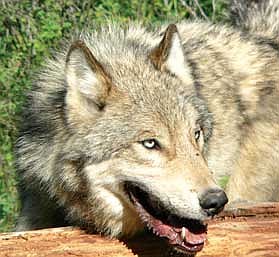Lawmakers keep aim on wolves
Montana’s congressional delegation is
keeping the federally-protected gray wolf in its crosshairs.
Sen. Jon Tester fired off a letter to
Secretary of the Interior Ken Salazar asking for regulated hunting
of wolves to control numbers. Meanwhile, Rep. Denny Rehberg
introduced two bills that would remove wolves from Endangered
Species Act protection.
Tester said in a recent phone interview
that it’s a big issue among Montanans.
“We hear a lot of different issues but
it’s a concern to me because we visited with a number of folks on
it,” Tester, who chairs the Congressional Sportsmen’s Caucus, told
The Western News. “It’s a concern and a problem that needs to get
fixed.”
The senator’s letter to Salazar
requested the reinstatement of a gray wolf conservation hunt in
Montana.
“A regulated hunt of wolves is well
within the scope of the Endangered Species Act and will enhance the
management of wolves in the state and throughout the region,”
Tester wrote to Salazar. “It will reduce actual and perceived
pressure from this species on Montana’s ecosystem and agricultural
economy while honoring our state’s hunting heritage.”
Tester said he wanted Salazar to know
the economic impact of the wolf situation in Montana. The senator
said he’s had people tell him that something was needed to simply
send a message.
“You’ve got people who are having some
economic difficulty because of these dog-gone things,” Tester said.
“We’re going to work on getting things done. That’s why I sent a
letter off to secretary Salazar to say this is where we were.”
Tester told Salazar that the denial of
a conservation hunt has severely limited the state’s ability to
resolve the issue.
“Allowing a regulated hunt will expand
the state’s management options for this predator and restore
balance to the system,” he wrote. “This action will protect elk and
livestock while not jeopardizing the gray wolf recovery.”
Rehberg’s legislation seeks to
completely remove federal management of wolves. In one bill –
co-sponsored by Rep. Mike Simpson (R-Idaho) and Rep. Raul Labrador
(R-Idaho) – wolves would be completely removed from federal
protection with management authority returning to Montana and
Idaho.
The other bill would remove gray wolves
from the Endangered Species Act anywhere in the United States.
Rehberg said the issue has seen bipartisan support.
“The gray wolf isn’t endangered, which
is why Republicans and Democrats alike are joining forces to end
the misuse of the Endangered Species Act to advance extremist
policy agendas,” said Rehberg, a rancher from Billings. “I heard
from thousands of Montanans, and folks get it. They know that
states are better at managing our own local wildlife than the
federal government thousands of miles away.”
On Aug. 5, U.S. District Judge Donald
Molloy reinstated protection for gray wolves in Montana and Idaho.
Wolves were never delisted in Wyoming.
“The northern Rocky DPS (distinct
population segment) must be listed, or delisted, as a distinct
population and protected accordingly,” Molloy wrote in his
ruling.
As such, Molloy’s ruling stated that
the entire Montana-Idaho-Wyoming region cannot have separate
protections for the same wolf population in each state.
“Unless there’s a darn good reason –
and there’s not – the federal government has no business getting
involved,” Rehberg said. “Years of research, dedicated efforts by
landowners and local officials, and the expert opinions of
on-the-ground wildlife managers have been given a back seat to
profit-motivated environmental groups. We need to end this abuse
and solve an issue that should have been put to rest years
ago.”
Rehberg said wolf populations have far
surpassed even the revised recovery goals established by the
Endangered Species Act – 30 breeding pairs and 300 wolves for eight
consecutive years. But he added that a few well-funded special
interest groups have used dirty tricks to keep the gray wolf listed
as endangered.
“Increasing numbers of wolves in Idaho
show that protection under the endangered species act is no longer
needed,” Labrador said. “The Endangered Species Act is a tool to
recover a species, not a program for infinite and never-ending
federal oversight. The wolves are thriving, the science is
definitive and the time has come to delist the gray wolf
permanently.”
Simpson said a viable long-term
solution is needed to return authority to manage wolves to the
respective states.
“This input is reflected in these
bills, and I look forward to working with Congressmen Rehberg and
Labrador to move forward on this issue by seeing this bill signed
into law,” he said.
Rehberg’s second bill – which is just
one page in length – states that Endangered Species Act shall not
apply to gray wolves across the board. Ten Republicans and five
Democrats were listed as co-sponsors.
“The current impasse is a great
frustration to sportsmen and economically damaging to ranchers in
my state and it must be resolved,” Tester told Salazar. “The first
step in expanding state discretion is granting a conservation hunt
of gray wolves to restore the full range of tools to manage this
species.”

